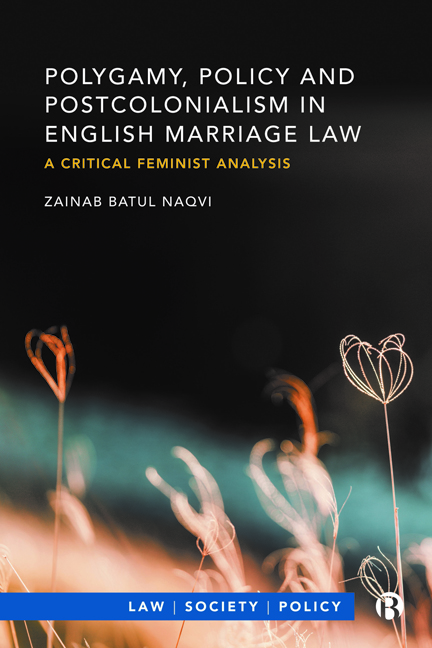Book contents
- Frontmatter
- Dedication
- Contents
- Series Editor’s Preface
- List of Cases
- List of Legislation
- Acknowledgements
- 1 Introduction: Polygamy, Law and Women’s Lives
- 2 Consciousness and Disruption in Critical Postcolonial Feminism
- 3 Polygamy in England: Tracing Legal Developments
- 4 History and Conflict of Laws in Overseas Polygamy
- 5 Tensions in Religion and Culture
- 6 Complicating Harm and Gender Equality
- 7 Religion, Recognition and Marriage Law
- 8 Final Thoughts and Reflections
- References
- Index
4 - History and Conflict of Laws in Overseas Polygamy
Published online by Cambridge University Press: 17 January 2024
- Frontmatter
- Dedication
- Contents
- Series Editor’s Preface
- List of Cases
- List of Legislation
- Acknowledgements
- 1 Introduction: Polygamy, Law and Women’s Lives
- 2 Consciousness and Disruption in Critical Postcolonial Feminism
- 3 Polygamy in England: Tracing Legal Developments
- 4 History and Conflict of Laws in Overseas Polygamy
- 5 Tensions in Religion and Culture
- 6 Complicating Harm and Gender Equality
- 7 Religion, Recognition and Marriage Law
- 8 Final Thoughts and Reflections
- References
- Index
Summary
Polygamy is recognised in law in many places around the world. In Chapter 3 I explored polygamous marriages celebrated in England. It was a tale of indifference, with English law showing little interest in domestic polygamy. In this chapter, I look at polygamy that is celebrated overseas which has attracted more attention than domestic polygamy, leading to two Law Commission reports in 1971 and 1985. However, these were published decades ago, so the level of attention is relative. When confronted with overseas polygamy, the English courts are usually deciding whether a polygamous marriage that is recognised by an overseas legal system should be recognised in English law. The courts look to private international law, also known as conflict of laws to help. This leads me to first explore the origins of this branch of law, to think about what influences the responses to overseas polygamy. Conflict of laws was developed because of colonial encounters and the desire to emphasise the difference and inferiority of non-European legal systems. This orientalist foundation governs responses to overseas marriages and when the courts look at these relationships, they are not just assessing the law of the place the marriage took place in, but the culture. I argue that current English law cannot be separated out from this context because these colonial influences determine the way overseas legal and cultural systems along with overseas polygamous marriage are assessed.
With more accessible case law around overseas polygamy in the English courts, I can examine legal attitudes and influences through patterns of discourse that appear in court judgments. This is inspired by Herman's argument that ‘judges are active agents in the production of orientalist, racialized and Christian discourse’ (2011: 20– 1). Thus, the best way to discover what judges think about polygamy is to analyse what they say. This is why I carry out a discourse analysis of their decisions. Here, discourse analysis concentrates on instances where speech equates to action. A judicial decision is not just speech, but ‘is intended to create an action, both in respect of the parties in the instant case and, where applicable, in future cases’ (Harding, 2012: 434). By looking for patterns of discourse in these decisions, we can see what influences judicial perceptions of polygamy. I show how the imperialist mentality present in the statutory framing bears out in real-life interactions in the courts.
- Type
- Chapter
- Information
- Polygamy, Policy and Postcolonialism in English Marriage LawA Critical Feminist Analysis, pp. 73 - 100Publisher: Bristol University PressPrint publication year: 2023



